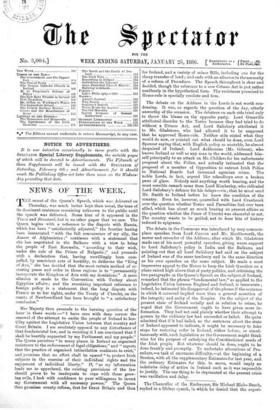The debate on the Address in the Lords is not
worth con- densing. It was, as regards the question of the day, utterly unworthy of the occasion. The debaters on each side tried only to throw the blame on the opposite party. Lord Granville attributed disorder to the Tories because they had tried to do without a Crimes Act, and Lord Salisbury attributed it to Mr. Gladstone, who had allowed it to be supposed that he approved Home-rule. Neither side stated what they would do now, or pointed out what should be done, even Lord Spencer saying that, with English policy so unstable, he almost despaired of Ireland. Lord Ashbourne (Mr. Gibson), who knows Ireland as well as any man in the world, addressed him- self principally to an attack on Mr. Childers for his unfortunate proposal about the Police, and actually intimated that the proposal of a member of Opposition to entrust Irish Police to National Boards had increased agrarian crime. The noble Lords, in fact, argued like schoolboys over a broken pane of glass. Nobody said anything worth hearing, and the most sensible remark came from Lord Kimberley, who ridiculed Lord Salisbury's defence for his delays—viz., that he must send Mr. Smith to Ireland before he knew the condition of the country. Even he, however, quarrelled with Lord Cranbrook over the question whether Tories and Parnellites had ever been allied, which has about as much bearing on present affairs as the question whether the Peace of Utrecht was shameful or not. The country wants to be guided, not to hear bits of history reduced to epigrams.


































